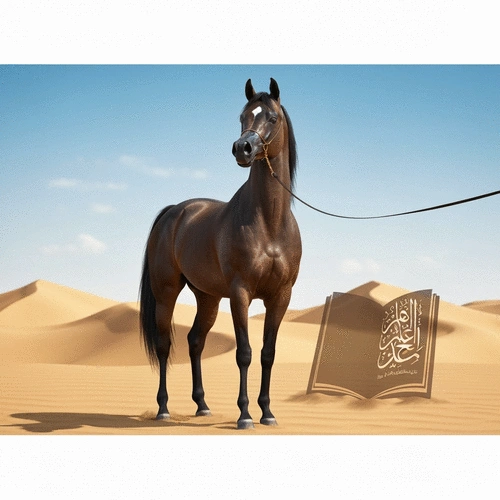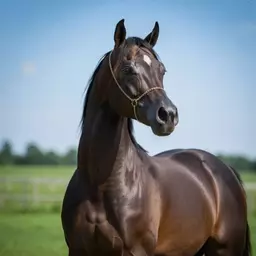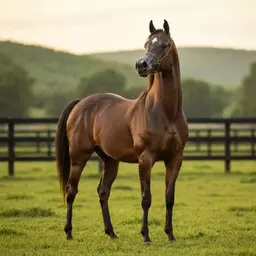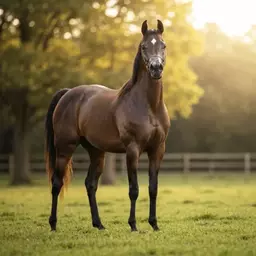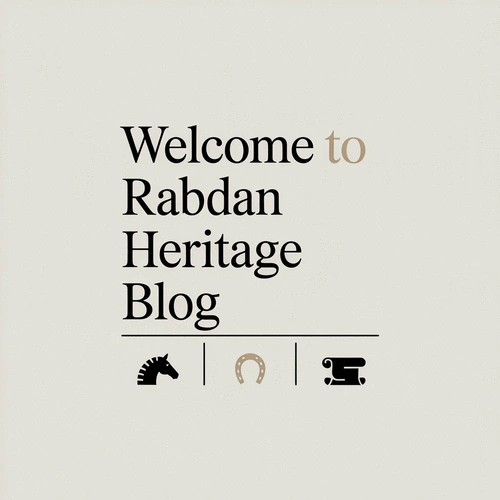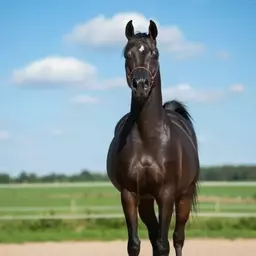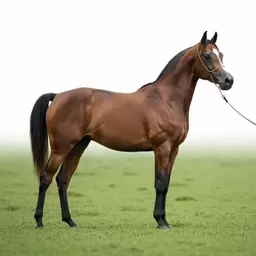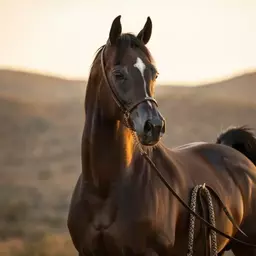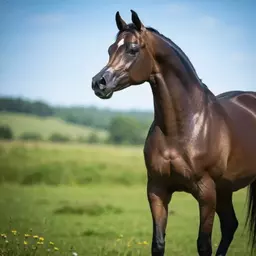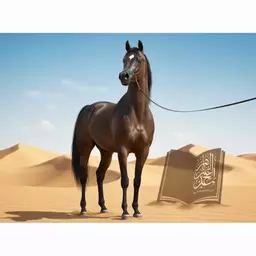In the realm of Arabian horse breeding, few names resonate as profoundly as Ibn Rabdan. His legacy is not just about bloodlines; it is a narrative woven with cultural significance and community engagement. As we delve into his impact, consider how the qualities he embodied continue to influence modern practices and connect generations of horse lovers.
What You Will Learn
- The historical breeding practices that set the stage for Ibn Rabdan's legacy.
- The concept of prepotency and its vital role in shaping future horse generations.
- Cultural stories that enrich the significance of the Arabian horse community.
- How modern breeders utilize Ibn Rabdan's lineage to guide breeding decisions today.
- The essential contributions of breeders in preserving the Rabdan bloodline and its heritage.
- How engaging with the horse community fosters a deeper appreciation for Arabian horse culture.
Ibn Rabdan's Enduring Influence on Arabian Horse Breeding
The visual below illustrates the multifaceted legacy of Ibn Rabdan, highlighting how his historical significance, prepotency, and the dedicated efforts of breeders continue to shape the Arabian horse community.
Ibn Rabdan: Cornerstone of Arabian Horse Breeding
His lineage, prepotency, and cultural significance continue to inform modern breeding practices, exemplifying the ideal Arabian type.
Key Themes of Legacy
- Historical Breeding Practices
- Exceptional Prepotency
- Deep Cultural Significance
Breeders' Vital Contributions
- Meticulous Selection & Diversity
- Education & Advocacy
- Documenting Lineage
The Historical Significance of Ibn Rabdan in Arabian Horse Breeding
When we talk about the history of Arabian horse breeding, we can't overlook the profound legacy of Ibn Rabdan. This extraordinary stallion not only left an indelible mark on the breed but also shaped the very landscape of equine heritage. His influence extends far beyond the racetrack or the show ring, encapsulating the spirit of Arabian horses themselves.
As a passionate equestrian and historian, I find it captivating to explore how Ibn Rabdan's impact resonates through generations. His distinct characteristics and superior qualities have paved the way for the modern Arabian horse we admire today.
Understanding the Legacy of Ibn Rabdan
Ibn Rabdan’s lineage is a treasure trove of rich history that deserves our attention. Born from a lineage imbued with excellence, his ascendance in the world of Arabian horses can be contextualized through several key themes:
- Historical Breeding Practices: Understanding how breeders historically approached Arabian horse breeding helps us appreciate Ibn Rabdan's uniqueness.
- Prepotency: His ability to pass on desirable traits to his offspring has significantly shaped subsequent generations.
- Cultural Significance: The cultural stories intertwined with his line invoke a sense of pride and connection among horse enthusiasts.
His legacy isn’t merely about bloodlines; it’s about the stories and dreams that every Arabian horse embodies. Each horse that traces its ancestry back to Ibn Rabdan carries a piece of that extraordinary heritage.
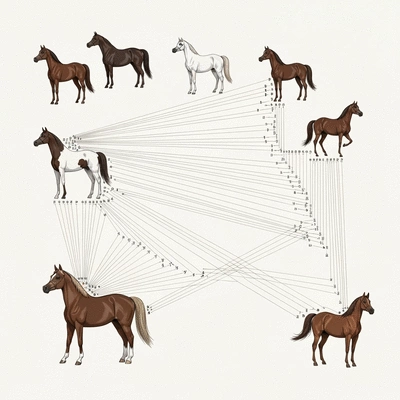
Contextualizing His Impact on Arabian Horses
To fully appreciate Ibn Rabdan’s significance, we must consider how his lineage has influenced breeding decisions across the globe. He is often regarded as a paragon of the Arabian type, exemplifying the traits that many breeders aspire to cultivate. His remarkable presence in the ring has made him a sought-after ancestor, leading to the preservation of his bloodline. For a deeper understanding of how genetic lineage is studied and preserved, researchers often turn to comprehensive analyses like those found in studies on historical populations and their genetic makeup, which shed light on the complexity of preserving distinct bloodlines.
As I delve deeper into the history, I am reminded that it’s not just about the horses themselves but also about the community that celebrates their legacy. Every interaction among breeders, owners, and enthusiasts fosters a deeper appreciation for the exceptional qualities that Ibn Rabdan represents.
World Champion Type and Prepotency Explained
Ibn Rabdan is often celebrated for his world champion type, which encapsulates the ideal characteristics sought in Arabian horses. His prepotency means that he has a remarkable ability to transmit these traits to his progeny, resulting in horses that are not only beautiful but also possess the essence of Arabian spirit.
In breeding programs today, understanding prepotency is crucial. Here’s why:
- It guides breeders in selecting stallions that will enhance desirable traits.
- Understanding these genetics helps preserve the unique qualities of the Rabdan bloodline.
- The legacy of prepotency ensures that future generations remain connected to this noble heritage.
As we embrace the ongoing journey of Arabian horse breeding, Ibn Rabdan’s influence remains a beacon, guiding our efforts to honor and promote this exquisite lineage.
The Role of Arabian Horse Breeders in Preserving His Legacy
Breeders play an essential role in ensuring that the legacy of Ibn Rabdan continues to thrive. Their dedication and expertise shape the future of Arabian horses, maintaining the standards and qualities that this breed exemplifies.
Through thoughtful breeding practices, these enthusiasts are not just preserving a line; they are nurturing a culture that transcends time. Some of their key contributions include:
- Meticulous Selection: Choosing the right horses for breeding based on their bloodlines and character.
- Education and Advocacy: Sharing knowledge about the Rabdan bloodline with fellow horse lovers.
- Community Engagement: Creating networks that foster collaboration and support among breeders.
By working together, these dedicated individuals ensure that the essence of Ibn Rabdan lives on in every horse they breed, enriching the Arabian horse community.
Key Contributions of Breeders to Bloodline Development
Breeders are the guardians of Arabian horse heritage. Their understanding of genetics and history helps them make informed decisions that honor Ibn Rabdan’s legacy. They play a dynamic role in:
- Maintaining Genetic Diversity: Ensuring that bloodlines remain robust and healthy.
- Introducing New Blood: Carefully selecting outside horses to enhance the gene pool.
- Documenting Lineage: Keeping accurate records that trace back to Ibn Rabdan.
Every breeding decision reflects a commitment to preserving this noble heritage, ensuring that future generations of horse enthusiasts can appreciate the beauty and spirit of the Arabian horse.
How Breeding Programs Honor His Ancestry
Modern breeding programs actively seek to honor the ancestry of Ibn Rabdan through strategic planning and collaboration. This is not just about continuing a line; it’s about celebrating a rich history that needs to be upheld. Here’s how:
- Incorporating Historical Knowledge: Breeders often rely on historical context to inform their breeding choices.
- Building Partnerships: Collaborating with other breeders to maximize genetic potential.
- Engaging in Research: Staying updated with the latest studies in equine genetics to support informed decisions.
As we navigate the future of Arabian horse breeding, it’s essential to reflect on how Ibn Rabdan's ancestry continues to shape our practices, fostering a vibrant community dedicated to preserving this remarkable legacy.
Frequently Asked Questions about Ibn Rabdan's Legacy
Engage with Us!
As we delve deeper into the legacy of Ibn Rabdan, we want to know your thoughts! What aspect of his impact on Arabian horse breeding resonates with you the most? Is it his historical significance, the principles of prepotency, or perhaps the community efforts in preservation? Share your insights below!
Summarizing the Influence of Ibn Rabdan on Arabian Horse Breeding
The legacy of Ibn Rabdan continues to shape the world of Arabian horse breeding today. His unparalleled pedigree is not just a mark of distinction but also a blueprint for modern breeding practices. As we explore the ongoing impact of his lineage and progeny, it becomes clear that understanding his influence is essential for both breeders and enthusiasts alike.
Whether you are a seasoned breeder or a passionate admirer of Arabian horses, the reflection of Ibn Rabdan's contributions can be seen everywhere—from the show rings to breeding programs. His descendants consistently demonstrate the characteristics that make Arabian horses so revered, including grace, endurance, and a rich cultural heritage.
The Ongoing Impact of His Pedigree and Progeny
One of the most fascinating aspects of Ibn Rabdan's influence is how it shapes contemporary breeding practices. Breeders today often look to his lineage for guidance, ensuring that they preserve the unique traits that define the Rabdan bloodline. Here’s how Ibn Rabdan’s legacy informs modern Arabian horse breeding:
- Pedigree Analysis: Breeders analyze genealogies to select the best traits for their breeding programs.
- Focus on Temperament: The harmonious temperament of his descendants is a priority for many breeders.
- Health Considerations: Emphasis on genetic health ensures the vitality of future generations.
These aspects not only honor Ibn Rabdan's legacy but also enhance the overall quality and representation of Arabian horses in the equestrian community.

The Role of Equine Studies in Understanding His Influence
Equine studies provide invaluable insights into the genetics and history of breeds, including the significant impact of Ibn Rabdan. Research in equine genetics informs current breeding strategies, allowing breeders to make informed decisions based on scientific data. For instance, studies like the historical population genetics of specific domestic animals offer crucial frameworks for understanding lineage and genetic preservation.
Here are some of the key areas where modern research intersects with historical knowledge:
- Genetic Mapping: Understanding the genetic traits passed down through generations helps in breeding for specific qualities.
- Performance Analysis: Studies on performance metrics help gauge the success of breeding decisions based on tangible outcomes.
- Preservation of Heritage: Research contributes to maintaining the integrity and diversity of Arabian horse breeds.
By embracing the findings from equine studies, we can appreciate how Ibn Rabdan's legacy continues to resonate in today’s breeding practices.
Engaging with the Community: Your Role in Preserving the Legacy
As horse lovers and breeders, we all have a part to play in preserving the rich legacy of the Rabdan bloodline. Engaging with the community not only fosters a deeper understanding of Arabian horse heritage but also allows us to keep the spirit of Ibn Rabdan alive. So, how can you contribute to this growing tapestry of knowledge?
Contributing to the Study of Arabian Horse Lineages
One effective way to engage with the community is through interactive pedigree charts and visualizations. These tools can help us map out lineages, making it easier to see connections and understand the significance of different bloodlines. Here are a few suggestions for utilizing these resources:
- Interactive Charts: Use online platforms that allow you to visualize relationships between various Arabian horses.
- Engagement with Breeders: Collaborate with breeders to share insights and stories about lineage.
- Educational Workshops: Attend or organize workshops focused on Arabian horse genetics and heritage.
Encouraging further research and discussion among enthusiasts will enhance our understanding of these majestic creatures and their histories.
Building Connections with Horse Communities
Moreover, fostering connections within horse communities can lead to exciting collaborations on breeding projects. Here are some ways you can get involved:
- Join Local Associations: Becoming a member of local horse associations can widen your network of contacts in the breeding community.
- Participate in Forums: Engage in online forums where enthusiasts discuss breeding techniques and share experiences.
- Attend Shows and Events: Attend horse shows to meet breeders and discuss the characteristics of their horses.
By building these connections, you not only enhance your own knowledge but also contribute to a vibrant community dedicated to preserving the legacy of Arabian horses.
Recap of Key Points
Here is a quick recap of the important points discussed in the article:
- Historical Breeding Practices: Understanding the history of Arabian horse breeding enhances appreciation for Ibn Rabdan's uniqueness.
- Prepotency: Ibn Rabdan's ability to pass on desirable traits has significantly influenced subsequent generations.
- Cultural Significance: The stories associated with Ibn Rabdan foster pride and connection among horse enthusiasts.
- Breeder Contributions: Meticulous selection, education, and community engagement are essential for preserving Ibn Rabdan's legacy.
- Modern Breeding Practices: Breeders today utilize pedigree analysis and focus on temperament and health to honor Ibn Rabdan's ancestry.

